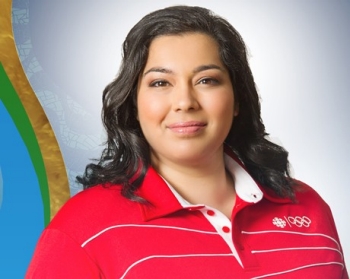Karnick’s regular gig is on CBC Radio One’s All in a Weekend and on CBC Television’s local weekend program Our Montreal. She’s worked as a sports reporter for the Daybreak radio program since 2005.
Her coverage has included Stanley Cup playoffs, the Sochi 2014 Winter Olympics in Russia and the Toronto 2015 Pan Am Games.
Covering the Olympics takes extra effort. “The days are long, especially because in my downtime I’ll be studying for the upcoming events,” she says. Karnick also hopes to keep a behind-the-scenes blog while in Brazil.
She recognizes the significance of covering the games, which are held every four years and followed by many millions around the globe.
“It’s not your everyday job,” Karnick says. “You understand how special this is when you’re talking to someone who’s going for the first time or winning their first medal.”
As part of her preparation for the assignment, the reporter met many of Canada’s athletes before setting off for the games. “Most of them are incredible ambassadors,” she says.
Remaining objective
Karnick is careful to leave the task of representing Canada to the athletes. “I’m there as a journalist, not a cheerleader,” she says. “Of course I’m excited when Canada is successful. When they aren’t, I have to cover that as well.”
An example of putting her patriotism aside as a journalist came with figure skater Patrick Chan at the 2014 Sochi Winter Olympics, she reveals. In his performance, Chan fell twice, taking home a Silver Medal — instead of a much-anticipated Gold.
“If I were there as his fan I would have said something like: ‘Are you okay? Don’t worry, it was fine,’” Karnick says. “But it was my responsibility to ask, ‘You had a whole country behind you, supporting you and you’ve won world championships — so what happened?’”
Despite facing criticism on social media, Karnick stands by her question. “My job isn’t to make myself look good, it’s to get an honest answer,” she says.
“That’s what I got from Chan; he apologized to the country. He wasn’t taking it lightly, and that’s what I wanted to get out of him.”
University starting point
Karnick says prioritizing her responsibilities as journalistic and putting aside her biases are qualities she learned in Concordia’s departments of journalism and communication studies. “Having professors occasionally drop me a line and say that looked good or that sounded good — that helps,” she says.
After graduating from the university in 2000, she signed a production contract with Young Canada Works — a summer job program — and CBC.
“I never saw anyone like me at the forefront in sports or in media,” says Karnick, one of few Indo-Canadian women in her industry. “I never thought I was going to be someone who was in front of the camera or on the microphone.”
It eventually clicked with Karnick that she was being given primarily on-air jobs. She started to change her attitude.
“I don’t think it helps anyone for me to try to deny what I look like or change it. For me to give other people confidence, I need to have confidence in myself,” she says.
“At the end of the day, I get to tell these incredible stories of the human spirit and the human body.”
Sonali Karnick will be active on social media throughout the Olympic Games. Follow her on Twitter: @sonalikarnick.


 CBC reporter Sonali Karnick, BA 00, says of her role, “I have two options: to alienate people or educate them. Most times I choose to educate.” | Photo courtesy of CBC
CBC reporter Sonali Karnick, BA 00, says of her role, “I have two options: to alienate people or educate them. Most times I choose to educate.” | Photo courtesy of CBC